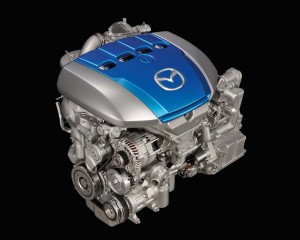Mazda is hoping that old motor sports adage, “Win on Sunday, Sell on Monday,” still holds. Aware it will have plenty of convincing to do when it launches its new SkyActiv diesel next year the maker plans to turn to motor sports to get its message across.
A beefed-up version of the production SkyActiv-D, as in diesel, making somewhere around 400 horsepower will make its debut in the months ahead as part of the 2013 Grand Am GX Class. The new GX series has been designed specifically to spotlight advanced and clean engine technologies.
“We’re hoping this will help (showcase) diesel attributes for those people who hadn’t considered them before,” explained John Doonan, Mazda North America’s Director of Motorsports.
It’s not the first time Mazda has taken to the track with non-traditional powertrain technology. It was the first Japanese automaker to win at the grueling 24 Hours of Le Mans, in fact, using its trademark rotary engines – which still run in a number of race circuits today, even though Mazda will soon pull the Wankel rotary from production.
But diesel is not a technology traditionally associated with Japanese makers, in general, nor with motor sports.
That has, of course, begun to change. On the racing front, Audi has become a dominant player in endurance racing with a series of diesel-powered models such as its latest, the R19. Peugeot and Volkswagen have also raced diesels in recent years – though both makers recently pulled out of their diesel programs.
While most Japanese makers now offer diesel powertrains in Europe – where oil-burner technology currently accounts for about half of all new vehicle sales – Mazda will soon become the first Asian to offer a diesel in its U.S. fleet in decades.
The Mazda diesel will be part of the maker’s new SkyActiv system. Using a variety of technologies, noted Doonan, the goal is to deliver diesel-like mileage with SkyActiv gas engines, while getting the SkyActiv-D up into the hybrid fuel economy range.
To get there, Mazda has gone with a relatively low compression ratio of just 14:1 for the 2.2-liter inline-four diesel. That approach will be shared on the racing engine though for the track the maker plans to bolt on a two-stage turbocharger – which is meant to overcome traditional turbo lag at low speeds.
Doonan would not reveal which Mazda vehicle will run in the GX Class but did suggest that it should churn out somewhere in the range of 400 hp.
A podium finish could be just what the maker – and, arguably, competitors also trying to sell diesel – needs. “It’s been a tough sell in this market,” said Doonan, trying to will over potential diesel buyers.
But there have been some signs that the technology is picking up momentum. About 20% of the new Passat sedans being sold by Volkswagen are being shipped with the diesel powertrain, compared with the maker’s original estimate of about 15% to 17%. And Jonathan Browning, CEO of Volkswagen Group of America, last week revealed plans that would allow VW to deliver 30% of U.S. Passats with diesels if demand requires.
Meanwhile, General Motors will test the waters in the mainstream passenger car market when it launches a diesel version of the Chevrolet Cruze next year.
“We think this will let us showcase our street technologies on the track,’ said Mazda’s Doonan of the GX series. And if Mazda can deliver a podium win on a Sunday it hopes it will be able to sell not just on Monday but all week long.


